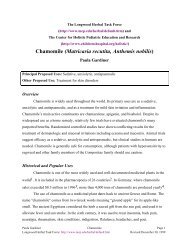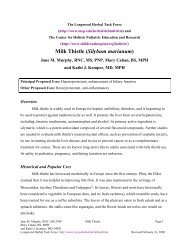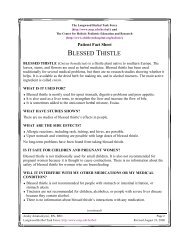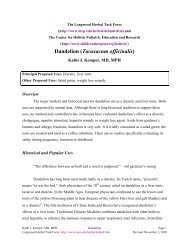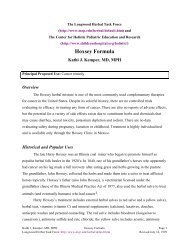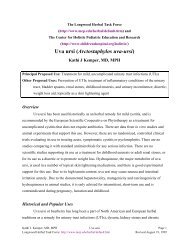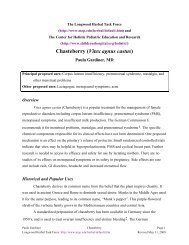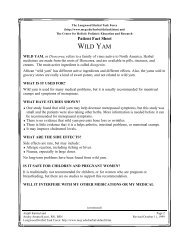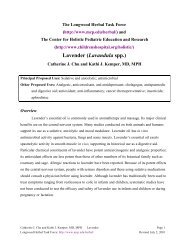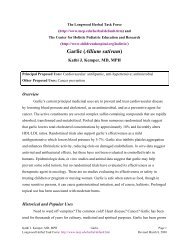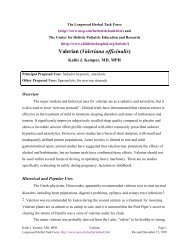Devil's Claw (Harpagophytum procumbens) - Longwood Herbal ...
Devil's Claw (Harpagophytum procumbens) - Longwood Herbal ...
Devil's Claw (Harpagophytum procumbens) - Longwood Herbal ...
You also want an ePaper? Increase the reach of your titles
YUMPU automatically turns print PDFs into web optimized ePapers that Google loves.
Toxicity and Contraindications<br />
All herbal products carry the potential for contamination with other herbal products, pesticides,<br />
herbicides, heavy metals, and pharmaceuticals.<br />
This is particularly concerning with imports from developing countries.<br />
Allergic reactions can occur to any natural product in sensitive persons.<br />
Allergic reactions have not been reported.<br />
Potentially toxic compounds in Devil’s claw: Unknown. Devil’s claw is occasionally adulterated<br />
with harpagoside-poor primary roots or with other bitter African plants such as<br />
Elephantorrhiza and Acanthosicyos.<br />
Acute toxicity: In a trial of Devil’s claw as a treatment for arthritis, one patient withdrew after<br />
four days of therapy due to early morning headache, tinnitus, anorexia and loss of taste 28 .<br />
Mild gastrointestinal upset has been reported in sensitive individuals, especially at higher<br />
dosages. The LD 50 in mice is greater than 13.5 grams per kg of body weight 21 , 23 , 34 .<br />
Because of the lack of effect on the biosynthesis of prostanoids, the adverse effects<br />
usually expected with non-steroidal anti-inflammatories and glucocorticoid medications<br />
are not expected with Devil’s claw 30 , 35 .<br />
Chronic toxicity: None in rat studies<br />
Limitations during other illnesses or in patients with specific organ dysfunction: Devil’s claw is<br />
traditionally contraindicated in patients with gastric or duodenal ulcers due to presumed<br />
stimulation of gastric acid secretion; no studies have evaluated this possibility. Because<br />
of its stimulant effects on the gall bladder, herbalists recommend that patients with<br />
gallstones use Devil’s claw only in consultation with a physician. Traditionally, Devil’s<br />
claw is contraindicated in diabetes, but no data support this assertion. In light of its<br />
potential antiarrhythmic effects, potential interactions with antiarrhythmic drugs cannot<br />
be excluded.<br />
Interactions with other herbs or pharmaceuticals: None reported<br />
Safety during pregnancy, lactation and/or childhood: Devil’s claw is thought to be oxytocic and<br />
therefore to be avoided in pregnancy 25 ; however, there are no data to support this<br />
recommendation, and no data on Devil’s claw’s safety or efficacy during pregnancy,<br />
lactation, or childhood.<br />
Kathi J. Kemper, MD, MPH Devil’s <strong>Claw</strong> Page 6<br />
<strong>Longwood</strong> <strong>Herbal</strong> Task Force: http://www.mcp.edu/herbal/default.htm Revised July 29, 1999




